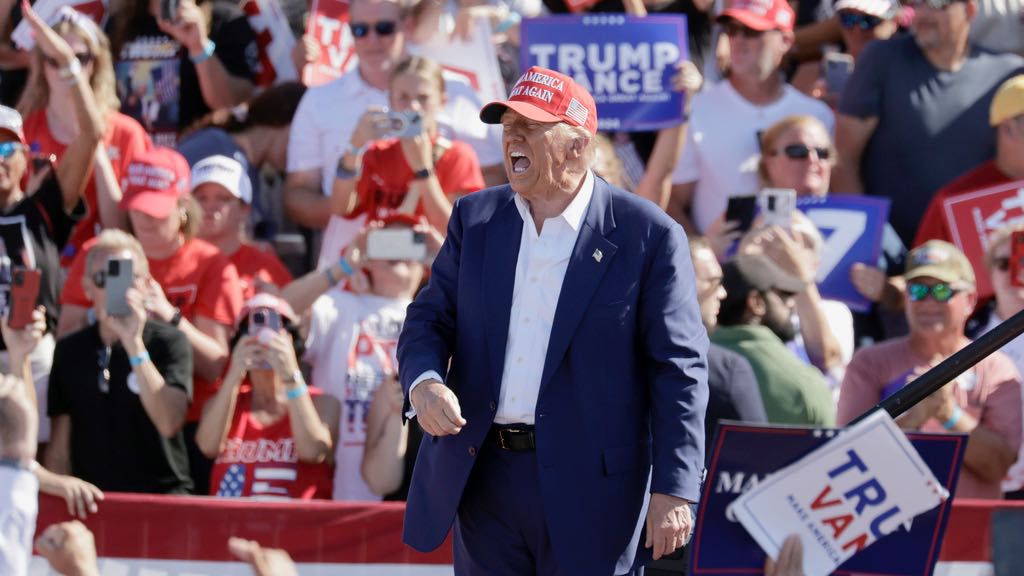Republican presidential candidate Donald Trump publicly rejected a debate rematch with Vice President Kamala Harris during his rally in Wilmington, North Carolina, on Saturday, insisting that the proposed date is too close to the election.
He also later insisted that he would "surge federal law enforcement" to so-called "sanctuary cities" and force them to "turn over criminal aliens" in an expansion of his previous "mass deportation" rhetoric.
The appearance in North Carolina was Trump's first following a report from CNN charging that Lt. Gov. Mark Robinson, the state's Republican nominee for governor, made a series of comments on a pornographic website’s message board which appear to show him referring to himself as a “black NAZI” and saying that “slavery is not bad” and wishing “they would bring it (slavery) back.”
Robinson denied the report and has vowed to stay in the race. Harris' campaign launched an ad on Friday seeking to tie Trump to Robinson, juxtaposing Trump’s praise for the North Carolina Republican with his comments in opposition to abortion. Trump did not mention Robinson on Saturday, nor did Robinson attend the rally.
"The problem with another debate is that it’s just too late. Voting has already started," Trump said, before arguing that Harris had a "chance" to do another debate on Fox News, but turned it down.
CNN and the Harris campaign announced earlier Saturday that the Democratic candidate for president agreed to an Oct. 23 debate, about two weeks before Election Day on Nov. 5. Harris was roundly praised for her debate performance against Trump.
"You know, it’s like a fighter. She sees the poll, she sees what’s happening, she’s losing badly, but it’s like a fighter who goes into the ring and gets knocked out. The first thing he says is, I want a rematch," Trump said.
Then-President Trump agreed to late debates in 2020. His first debate against then-candidate Joe Biden took place on Sept. 29, and the second happened on Oct. 22. Both took place after voting had begun in at least four states.
FiveThirtyEight’s average of national presidential polls observes that Harris has a 2.8 point polling lead over Trump, and has held a lead of at least 2.4 points since the Sept. 10 debate.
The former president also offered several new pledges, including a promise to grant full federal recognition to the Lumbee Tribe of North Carolina, a Native American tribe that has gained partial recognition from the federal government, but isn’t eligible for federal services.
He also pledged to end "sanctuary cities" under his administration, promising to push Congress to force cities to cooperate with federal immigration authorities.
Trump made a similar promise in his 2016 campaign. Soon after winning election, he signed an executive order saying that cities that didn't cooperate would not receive federal funds, except as required by law. Federal courts largely halted that plan in a series of decisions, though a federal appeals court allowed the Justice Department to use immigration enforcement cooperation to prioritize issuing certain grants.
As the 2020 election ramped up, Trump again targeted sanctuary cities, suggesting that he would consider withholding federal aid to such cities as they requested help during the pandemic. Within months of entering office, Biden ended the Trump-era policy.
"As soon as I take office, we will immediately surge federal law enforcement to every city that is failing — which is a lot of them — to turn over criminal aliens, and we will hunt down and capture every single gang member, drug dealer, rapist, murder and migrant criminal that is being illegally harbored," Trump said.
Trump has continually attacked immigrants, insisting that undocumented migrants are "taking over our country" and "crushing the jobs and wages of African American workers and Hispanic American workers, and also union members." The former president has cited no data for this claim, though anti-immigration think tanks like the Center for Immigration Studies have frequently argued that migrants primarily take low-skill jobs, harming the prospects of Black and Latino workers.
However, the former president cited a comment by Federal Reserve Chair Jerome Powell, who told reporters Wednesday that "there has been quite an influx across the borders and that has been one of the things that has allowed the unemployment rate to rise."
Powell’s remarks came two months after a July Senate committee hearing in which the Fed chair told Sen. JD Vance — days before the Ohio senator became Trump’s running mate — that he believes immigration hasn’t worsened inflation.
"My sense is that in the long run, immigration is kind of neutral on inflation; in the short run, it may actually have helped, because the labor market got looser," Powell said.
Trump’s claims of immigrants spiking violent crime nationally also are unproven, and conflict with federal violent crime statistics that show crime falling since 2020.
The GOP ticket is expected to return to the campaign trail on Monday. Trump will campaign in the city of Indiana, Pennsylvania, while Vance will stop in Charlotte, North Carolina.



